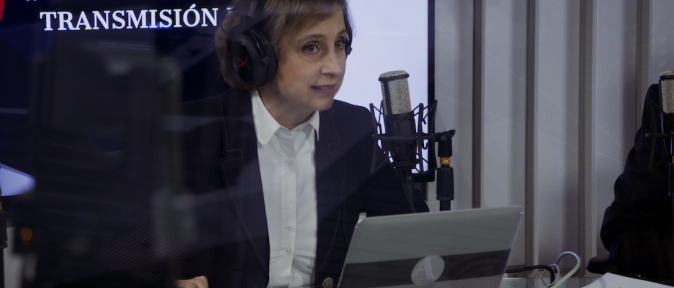Murdered with impunity for doing their job, Mexican journalists are among the thousands of innocent victims claimed by the country’s rampant organized crime, often aided by the very institutions tasked with persecuting it. Few seemingly democratic countries are as brutally dangerous as Mexico for those who practice the profession.
Under such violent climate, Silencio radio (Radio Silence), a documentary by Juliana Fanjul and financed through Swiss production company AKKA Films and Mexico’s CactusDocs, follows respected Mexican journalist and anchorwoman Carmen Aristegui, famous for her incisive and fearless voice. As the PRI, the party that had governed Mexico for most of the 20th century, returned to power in 2012, Aristegui’s radio program gained relevance for her incisive criticism of the party’s executive power.
She asked the tough questions and always had the necessary “smoking gun” to back up her claims. In a country with no memory and ravaged by a culture of corruption, her presence was invaluable. But it wasn’t until she dropped a bombshell, “Enrique Peña Nieto’s White House,” a report that revealed illicit dealings involving the now ex-president and a public transportation project, that her resilience was aggressively tested.
Censorship swiftly followed. She was dismissed immediately from MVS Radio, where her program held enviable ratings. There was no doubt someone had called for her head, or more precisely, her tongue. Having Aristegui on the airwaves was a major liability for the corrupt puppeteers pulling the strings. Fanjul chronicles Aristegui’s legal efforts to obtain justice, and, more importantly, how she built her own online outlet, Aristegui Noticias, from the ground up to better serve the public.

Shown in her day-to-day activities, in conversations with colleagues and encounters with everyday citizens that admire and trust her, Aristegui comes off as approachable but resolute and disciplined. There’s no hint of arrogance, but a genuine interest in engaging with ideas and to preserve integrity even in the direst of circumstances. It’s only when discussing how authorities used the Pegasus surveillance system to harass her son that we get to see a talking-head interview with the brilliant figure.

Even at that moment Aristegui appears pragmatic. She keeps her vulnerability private, because under the vicious scrutiny of forces that want to discredit her — be it cartel bosses, corrupt politicians, or both — there’s too much at stake to portray weakness. After exposing that Peña Nieto plagiarized a third of his thesis while in school, Aristegui and those around her were once again a target, but the retaliation only proved they were on the right track.
Fanjul doesn’t assume the viewer knows the chronology of events or their players, which lets those unfamiliar with these Mexican predicaments easily grapple with critical information beyond whatever the official narrative was at the time. Felipe Calderón’s inept war on the cartels, the case of the 43 Ayotzinapa missing students (and Aristegui’s peerless reporting on it), and even Mexico’s most recent presidential election are interspersed into the central plot to contextualize this atrocious socio political timeline through the use of illustrative archival footage. Two other points, touched upon with less depth, deal with Mexican idiosyncrasy: the role of Televisa, the nation’s largest media empire, in the indoctrination of the population, and Catholicism preaching resignation rather than proactive involvement for change.
Objectivity is paramount in the pursuit of the truth, but there’s also great value in the director allowing herself to not be removed from the subject. Fanjul speaks viscerally, in voice-over narration, of how, as a Mexican, the collective trauma has impacted her. A mix of anguish and rage rings in her voice. Emotion is so indelible it slices through the facts she conveys. We unambiguously understand her potent statements, but it’s her somber intonation that shakes us.
In one of the doc’s most devastating sequences, Fanjul asks members of Aristegui’s team if they would be willing to die for their job. It’s a question that’s no mere hyperbole, but an actual, horrifying possibility. The memories of prominent journalists Javier Valdez in Sinaloa and Miroslava Breach in Chihuahua, both of whom were shot dead in broad daylight not long ago, no doubt linger strongly in all of their minds. Aristegui doesn’t explicitly answer this heavy inquiry, but her commitment through it all speaks volumes. She shouldn’t have to consider it, but she’s accepted the risk.
A sobering snapshot of Mexico’s recent history of government-sanctioned terror, Radio Silence approaches this systemic problem through a journalist’s battle about much more than her personal liberty to communicate, but rather her self-imposed duty to hold cynical and amoral structures of power accountable for the suffering inflicted on an entire country. The seismic impact of her and her team’s investigative work cannot be overstated.
Armored with superhuman optimism and untarnished credibility, Aristegui looks at the overwhelming abyss and still chooses to shine a bright light into its darkest corners. In a nation under fire, the only bulletproof constant is her unwavering conviction.
Silencio radio screened as the opening film of Ambulante en Casa.




